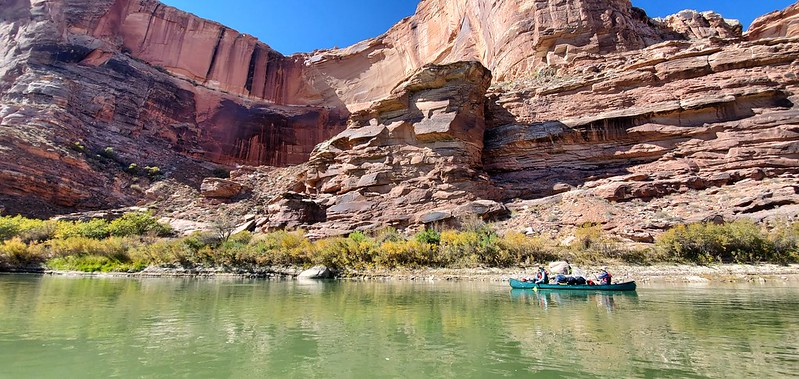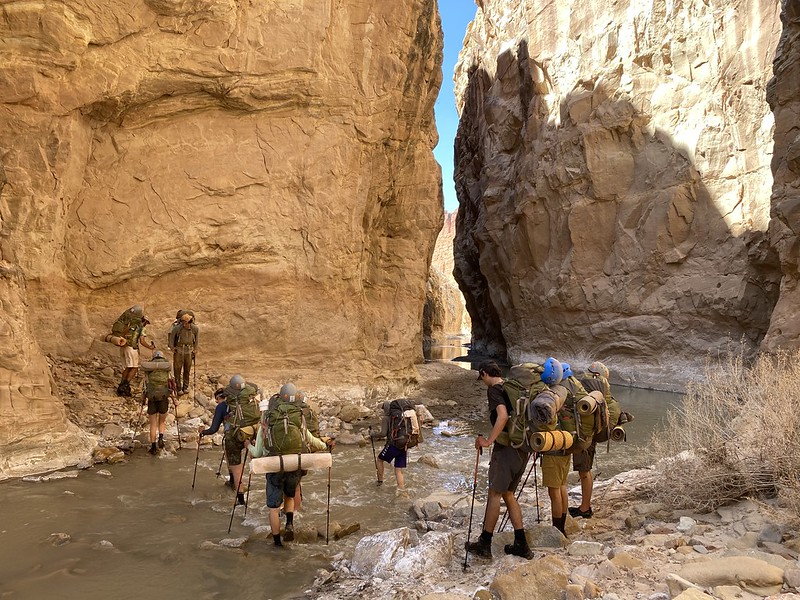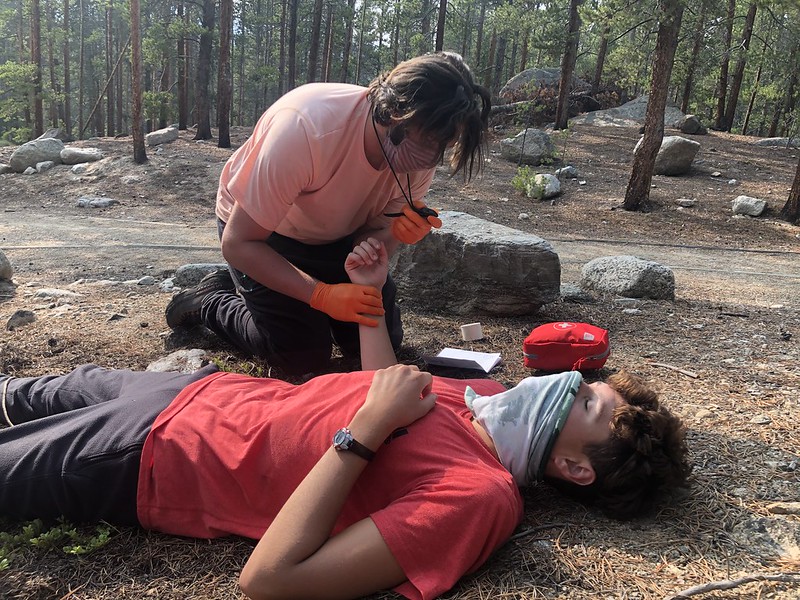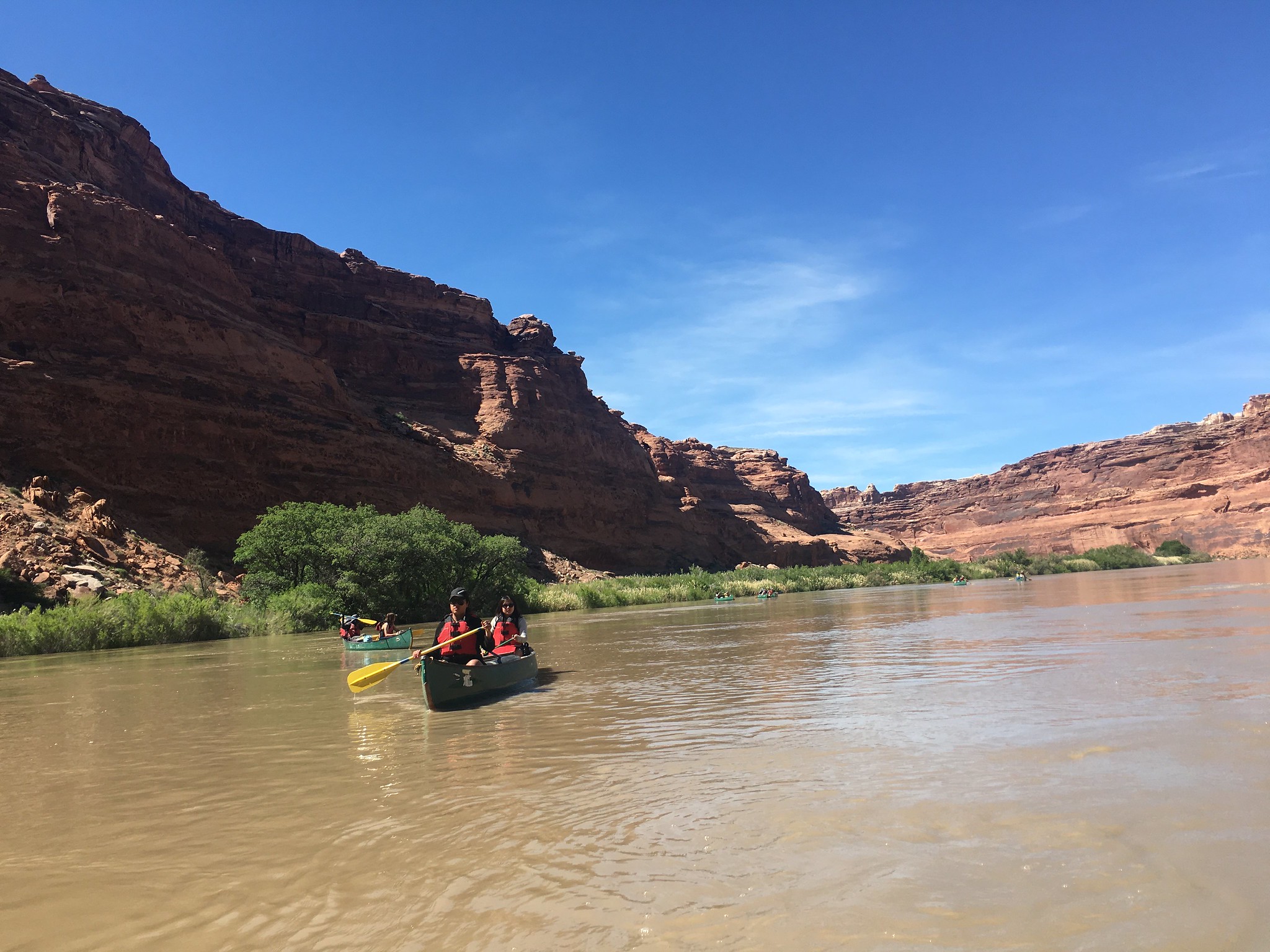CUPO-361: Pathfinder Southwest Canoeing & Canyoneering
Course Code: CUPO-361
Start Date: 3/12/23
End Date: 4/10/23
The map and compass we use to navigate new routes through canyons become a metaphor for life as we explore our path on the Southwest Pathfinder. The focus of this course is learning about self, connection, and direction. We will explore skills, passion, and challenge with the goal of gaining new perspectives needed for independence as well as exploring future directions. A Pathfinder course provides the opportunity for participants to chart a path, the motivation to begin their journey, resilience to recover from set-backs and the skills required to achieve their goals. While adventuring in the backcountry and tackling physical, mental, and emotional challenges, participants find answers to their most pressing questions: Who am I? What do I value? What am I good at? Where do I want to go? What skills do I need to weather the journey? The red rock canyon walls become companions, group mates become friends, and with each step we find our strength.
Utah's Canyon Country
The most spectacular aspects of the Utah landscape are the hidden treasures found within its vast canyon networks. The canyons are composed of a spell-binding labyrinth of towering walls, arches, and slot canyons just waiting to be explored. On course, these vibrant formations are a geological playground for scrambling and teamwork. The desert ecosystem is characterized by aromatic plants like sagebrush and juniper and birds soaring high above canyon walls. The days can be hot in the summertime, but it always cools down in the evenings. These regions are within the ancestral lands of the Ute, Pueblos, Southern Paiute, Diné, and Hopi nations.
Labyrinth Canyon, Utah
You will launch on the Green River in two-person canoes for 63 miles through Labyrinth Canyon. The river enters Labyrinth Canyon slowly, named for the serpentine path it carves as it dives deep into the redrock sandstone that characterizes southeastern Utah and the Canyonlands area. Narrow and winding side canyons, towering cliffs rising vertically out of the river, pinnacles and ledges all await you as you fine-tune your paddling strokes. The canoes provide you with great freedom and maneuverability. While many of the skills you learn canoeing are transferable to rafts, the small craft will demand a high level of coordination and cooperation with your canoeing partner. During this phase of your course, your instructors will introduce you to the most important elements of river life: environmental stewardship, outdoor cooking, first aid, natural history of the river canyons, the night sky, and of course, paddling skills. This region is within the ancestral lands of the Ute nations.

Ute lands
What is a land acknowledgment?
At the Colorado Outward Bound School, we include land acknowledgments in our work as a formal way to recognize and respect the traditional territories and Indigenous Peoples as stewards of the land. It is important to understand and acknowledge the comprehensive past, present, and future of the places we travel and to seek to understand our role therein. To recognize the land is an expression of gratitude and appreciation we give to the Indigenous Peoples who have been living and working on the land from time immemorial. Read more about land acknowledgments at Outward Bound here.
Non-Technical Canyoneering
With your crew, you will journey through the intriguing and difficult-to-explore canyon country, taking in the infinite shapes of the arches, towers, buttes, amphitheaters, overhangs, and domes. While doing this, you will be carrying a 45 to 60 pound backpack which will have all you need to thrive in the wilderness. Sometimes students will shed their backpacks for smaller daypacks to navigate into narrow slots or explore thousand-year-old cliff dwellings and rock art. Crews camp on expansive rock slabs, stopping along the way to explore microclimates and canyon ecosystems. All the while, you continue learning how to use maps and compasses, to cook meals for yourself and your crewmates, negotiate slickrock obstacles, find water, and live comfortably in the immense canyons. The days can be long and hard, but the canyons reward you with their jaw-dropping beauty. You will spend time in an incredible area where life becomes more in tune with the essentials of traveling through a landscape of rock, sand, sky -- feeling the sunshine on your face and watching the setting sun give way to stars.

📍Núu-agha-tʉvʉ-pʉ̱ (Ute) lands
Guided Reflection and Transference
At Outward Bound we believe there is no learning without reflection. Throughout course, you will be prompted to reflect on what you’re experiencing on course, and what it means in the greater context of your life. Sometimes this is a journaling exercise, sometimes a group sharing experience, and sometimes a moment of solitude to sit and think. You spend focused time toward course progression end exploring how your new knowledge, skills and attributes can apply to your life after course.
Solo
Solo is a time when you’ll get the opportunity to spend time alone during course. With sufficient food and equipment, your Solo will be a chance to reflect on your course experience, journal, and connect with nature. Depending on your course length and environmental factors, Solo can range from 30 minutes to an overnight experience. You will not travel during this time and your Instructors may check on you occasionally. Your solo site will be close enough to your Instructors in case of emergency, but far enough removed to enjoy solitude. Many students are initially nervous about solo, but later recall it as one of the highlights of their course.
Wilderness First Aid
Despite the best risk management, sometimes accidents happen, and knowing how to respond to injuries in a backcountry setting is a key skill for aspiring outdoor leaders. During this section, you will spend two days in a classroom at our basecamp, learning about wilderness medicine. You will have the opportunity to earn a Wilderness First Aid (WFA) certification during this course, which is considered a standard for many entry level jobs in the Outdoor Industry.

📍Núu-agha-tʉvʉ-pʉ̱ (Ute) lands
Service
Service is a pillar of the Outward Bound experience. On each course, students learn to practice intentional service to themselves, to others and to the environment. This may look like practicing self-care or supporting a crewmate who is having a hard day. Participants also learn to Leave No Trace ethics, practicing service to the environment by preserving and respecting the fragile ecosystems they encounter. Students experience firsthand the social and emotional benefits of acts of service. They are encouraged to bring this ethic of care to their life back home.
Canoeing
Canoeing is an opportunity to experience the jaw-dropping canyons and magic of the river. The tranquil waters allow for reflection and relationship-building with your canoe partner. The calm waters can change with up-canyon winds that require strength to push forward. The canoes provide you with great freedom and maneuverability. While many of the skills you learn canoeing are transferable to rafts, the small craft will demand a high level of coordination and cooperation with your canoeing partner. Canoeing allows for connection to place, water, and people.

Photo: Ashley Perry |📍Núu-agha-tʉvʉ-pʉ̱ (Ute), Diné, and Pueblos lands
The following is an example of what your itinerary may look like. Your actual course plan will vary according to weather, your group’s skills and abilities, and Instructor preferences.
Days 9-12: Basecamp Training in Moab, Utah – Camping on Base, and Wilderness First Aid Course and Certification
Day 13: Transition to Canyon Country Backpacking
Days 14-24: Canyonlands Backpacking and Solo
Day 25-28: Final Expedition – Apply all You’ve Learned to a Final Group Challenge
Day 29: Personal Challenge Event, Course End Celebration
Day 30: Departure home
Our expeditions help students grow into the best version of themselves. We use adventure in the outdoors to help students discover their strengths and build authentic connections with their peers. Compassion for oneself and others is foundational to the Outward Bound experience. As students develop outdoor skills, they also gain confidence and leadership tools that will last a lifetime. Course outcomes include:
- Belonging – students form deep connections founded upon respect, inclusion, and compassion
- Reflection – students learn self-awareness and practice empathy towards others
- Physical Engagement – students develop awareness and confidence in their bodies
- Courage – students develop the confidence to speak up for themselves and persevere through challenges
Watch to Learn More
Tuition
You can pay your tuition online through your Applicant Portal or make the payment over the phone by calling 720-381-6589.
If your payment is not received by the due date listed in your Enrollment Email and on your Applicant Portal, you will risk losing your spot on course and your $500 deposit. Please review our Admissions and Cancellation Policies.
Travel Insurance
Airfare, travel costs, and non-refundable tuition payments are expensive. Insurance to protect your trip and course is strongly encouraged. We recommend insuring these costs from the third-party provider InsureMyTrip. This provider has coverage options that include travel costs and non-refundable tuition costs. For more information and to receive a free quote, click here.
Click here for COBS COVID-19 Program Practices